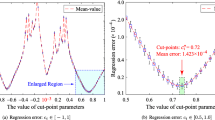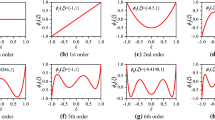Abstract
Improvement of computational methods used for the uncertainty analysis of critical experiments allows the accuracy of the results to be more realistically estimated, which is important for further improvement of computational codes and cross section libraries used to justify nuclear safety of the research on uses of nuclear energy. Standard uncertainty estimation methods (Monte Carlo, sensitivity analysis, etc.) have disadvantages arising from considerably growing needs for computational resources to be used for nonlinear problems with a lot of measured parameters that contribute to the total uncertainty of a critical experiment. This has provoked increasing interest in spectral methods for uncertainty analysis, in particular, the polynomial chaos method. In this work, the necessity of the regression analysis is substantiated for approximations of random variables by the polynomial chaos method to estimate uncertainties and confidence levels of the results of critical experiments.
Similar content being viewed by others
References
Evaluation of Measurement Data—Guide to the Expression of Uncertainty in Measurement, JCGM 100:2008.
Uncertainty and Target Accuracy Assessment for Innovative Systems Using Recent Covariance Data Evaluations (OECD-NEA, 2008).
R. G. Ghanem and P. D. Spanos, Stochastic Finite Elements: A Spectral Approach (Dover, New York, 1991).
N. Winer, Am. J. Math. 60, 897 (1938).
L. Mathelin, M. Hussaini, and T. Zang, Numer. Algorithms 38, 209 (2005).
M. M. R. Williams, Nucl. Sci. Eng. 155, 109 (2007).
E. D. Fichtl, A. K. Prinja, and J. S. Warsa, in Proceedings of the International Conference on Mathematics, Computational Methods and Reactor Physics, Saratoga Springs, New York, May 3–7, 2009, LA-UR-09-01151.
L. Gilli, D. Lathouwers, J. L. Kloosterman, and T. H. J. J. van der Hagen, Ann. Nucl. Energy 40, 35 (2012).
L. Gilli, D. Lathouwers, J. L. Kloosterman, T. H. J. J. van der Hagen, A. J. Koning, and D. Rochman, Ann. Nucl. Energy 56, 71 (2013).
M. Navarro, J. Witteveen, and J. Blom, arXiv:1406.5483.
Author information
Authors and Affiliations
Corresponding author
Additional information
Original Russian Text © A.V. Kuzmin, T.N. Korbut, 2017, published in Yadernaya Fizika i Inzhiniring, 2017, Vol. 8, No. 6, pp. 501–505.
Rights and permissions
About this article
Cite this article
Kuzmin, A.V., Korbut, T.N. Adaptation of the Polynomial Chaos Method for the Uncertainty Analysis of Critical Experiments. Phys. Atom. Nuclei 81, 1404–1407 (2018). https://doi.org/10.1134/S1063778818100095
Received:
Revised:
Accepted:
Published:
Issue Date:
DOI: https://doi.org/10.1134/S1063778818100095




